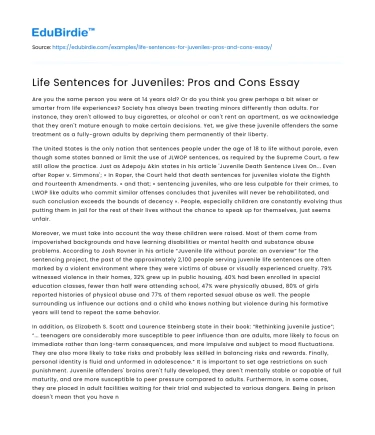Are you the same person you were at 14 years old? Or do you think you grew perhaps a bit wiser or smarter from life experiences? Society has always been treating minors differently than adults. For instance, they aren't allowed to buy cigarettes, or alcohol or can't rent an apartment, as we acknowledge that they aren't mature enough to make certain decisions. Yet, we give these juvenile offenders the same treatment as a fully-grown adults by depriving them permanently of their liberty.
The United States is the only nation that sentences people under the age of 18 to life without parole, even though some states banned or limit the use of JLWOP sentences, as required by the Supreme Court, a few still allow the practice. Just as Adepoju Akin states in his article 'Juvenile Death Sentence Lives On... Even after Roper v. Simmons'; « In Roper, the Court held that death sentences for juveniles violate the Eighth and Fourteenth Amendments. » and that; « sentencing juveniles, who are less culpable for their crimes, to LWOP like adults who commit similar offenses concludes that juveniles will never be rehabilitated, and such conclusion exceeds the bounds of decency ». People, especially children are constantly evolving thus putting them in jail for the rest of their lives without the chance to speak up for themselves, just seems unfair.
Save your time!
We can take care of your essay
- Proper editing and formatting
- Free revision, title page, and bibliography
- Flexible prices and money-back guarantee
Moreover, we must take into account the way these children were raised. Most of them come from impoverished backgrounds and have learning disabilities or mental health and substance abuse problems. According to Josh Rovner in his article “Juvenile life without parole: an overview” for The sentencing project, the past of the approximately 2,100 people serving juvenile life sentences are often marked by a violent environment where they were victims of abuse or visually experienced cruelty. 79% witnessed violence in their homes, 32% grew up in public housing, 40% had been enrolled in special education classes, fewer than half were attending school, 47% were physically abused, 80% of girls reported histories of physical abuse and 77% of them reported sexual abuse as well. The people surrounding us influence our actions and a child who knows nothing but violence during his formative years will tend to repeat the same behavior.
In addition, as Elizabeth S. Scott and Laurence Steinberg state in their book: “Rethinking juvenile justice”; “... teenagers are considerably more susceptible to peer influence than are adults, more likely to focus on immediate rather than long-term consequences, and more impulsive and subject to mood fluctuations. They are also more likely to take risks and probably less skilled in balancing risks and rewards. Finally, personal identity is fluid and unformed in adolescence.” It is important to set age restrictions on such punishment. Juvenile offenders' brains aren't fully developed, they aren't mentally stable or capable of full maturity, and are more susceptible to peer pressure compared to adults. Furthermore, in some cases, they are placed in adult facilities waiting for their trial and subjected to various dangers. Being in prison doesn't mean that you have no rights and their mental and sexual health should be a priority.
“People do things at 16 and 17 that they wouldn’t do at 37, but they spend a lifetime paying for it,” said Snyder, the state legislator of Florida. A life sentence at such a young age is a very rough sanction that should, in my humble opinion, be completely banned from all American states. Indeed, we shouldn't deny as well the freedom of those who were incarcerated as children. The justice system should give the mercy that every kid deserves.






 Stuck on your essay?
Stuck on your essay?

